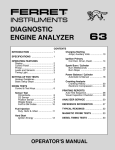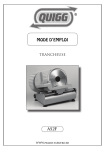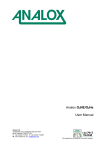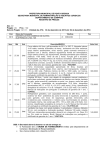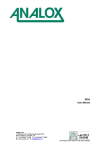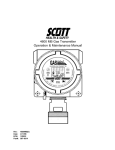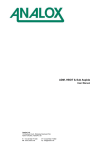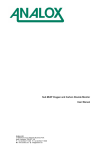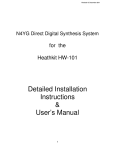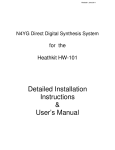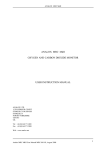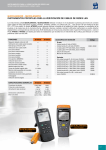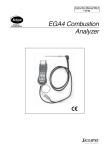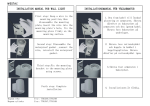Download ANALOX SUB Mk II F – Hyperbaric Oxygen and Carbon Dioxide
Transcript
ANALOX SUB Mk II F – Hyperbaric Oxygen and Carbon Dioxide Monitor With Automatic Pressure Compensation Installation and Operation Manual ` Analox Sensor Technology Ltd 15 Ellerbeck Court, Stokesley Business Park North Yorkshire, TS9 5PT T: +44 (0)1642 711400 F: +44 (0)1642 713900 W: www.analox.net E: [email protected] ANALOX SUB MKII – Installation and Operation Manual LIST OF CONTENTS 1 PACKAGING CONTENTS CHECK .......................................................................... 3 2 INTRODUCTION............................................................................................. 4 3 INSTALLATION.............................................................................................. 6 3.1 3.2 3.3 4 OPERATION ................................................................................................ 15 4.1 4.2 4.3 4.4 4.5 4.6 4.7 4.8 4.9 4.10 5 SWITCHING ON AND OFF ........................................................................... 16 MAIN DISPLAY SCREEN .............................................................................. 17 ALARM SYSTEM....................................................................................... 18 OXYGEN INJECTION SYSTEM........................................................................ 23 FUNCTION KEYS...................................................................................... 25 ALARM SETPOINT MENU............................................................................. 26 CALIBRATION MENU ................................................................................. 29 INTERFACE CALIBRATION MENU ................................................................... 36 SETUP MENU......................................................................................... 38 OXYGEN INJECTION MENU .......................................................................... 39 DATALOGGING............................................................................................. 40 5.1 5.2 5.3 5.4 5.5 6 MAIN PANEL MECHANICAL INSTALLATION...........................................................6 REMOTE SENSOR MECHANICAL INSTALLATION.....................................................8 SYSTEM ELECTRICAL INSTALLATION .................................................................9 RS232 DATA LOGGING CONNECTION .............................................................. 40 USE OF WINDOWS HYPERTERMINAL ............................................................... 42 RETRIEVE DATA: GET COMMAND................................................................... 43 DELETE DATA: DEL COMMAND...................................................................... 43 USE OF RETRIEVED DATA ........................................................................... 44 CALIBRATION .............................................................................................. 44 6.1 6.2 6.3 6.4 6.5 6.6 6.7 SEMI AUTOMATIC GAS CALIBRATION .............................................................. 45 PRESSURE SENSOR CALIBRATION .................................................................. 46 OXYGEN SENSOR CALIBRATION .................................................................... 46 CARBON DIOXIDE SENSOR CALIBRATION .......................................................... 47 TEMPERATURE SENSOR CALIBRATION ............................................................. 47 HUMIDITY SENSOR CALIBRATION................................................................... 49 INTERNAL CALIBRATION ............................................................................ 50 7 TROUBLESHOOTING ...................................................................................... 57 8 SAFETY WARNINGS ....................................................................................... 58 9 SPECIFICATION ............................................................................................ 59 10 DISPOSAL .................................................................................................. 49 Document Ref: AS2F-801-14 - January 2009 Page 2 ANALOX SUB MKII – Installation and Operation Manual 1 PACKAGING CONTENTS CHECK a) Analox Sub Mk II F main unit. b) Analox Sub Mk II F REM1 Oxygen, Carbon Dioxide and Depth Remote Sensor Unit c) Optional Analox Sub Mk II REM2 Temperature and Humidity Remote Sensor Unit d) Optional Analox Sub Mk II REM3 Oxygen Injection Controller Unit with control cable e) Optional Mains Cable (AC powered instruments only) f) Connecting cables to connect Main Unit to REM1 and optional REM2/REM3 units g) Calibration adaptors and tubing h) Optional Datalogging cable i) User Manual j) Test Certificate Please refer to the Safety Warning information in Section 8 and to the Caution notice in Section 3.3. Document Ref: AS2F-801-14 - January 2009 Page 3 ANALOX SUB MKII – Installation and Operation Manual 2 INTRODUCTION The Analox Sub Mk II F is a combined oxygen, carbon dioxide (CO2) and pressure monitor that automatically compensates the CO2 data for pressure effects. Optionally, temperature and humidity may also be measured if fitted at the time of manufacture. An optional controller module may also be added to provide oxygen injection to maintain oxygen levels at preset levels. Parameter Sensing technology Oxygen Carbon Dioxide Pressure Temperature Humidity Oxygen (Control Sensor) Electrochemical cell Infra-red absorption Strain gauge Platinum Resistor Capacitive Electrochemical cell Sensor Location REM1 REM1 REM1 REM2 REM2 REM3 The complete system consists of: a) The SUB Mk II F main unit intended for installation in control rooms (special versions are available if it is required to mount the Main Unit in the hyperbaric environment). b) The REM1 and optional REM2 and/or REM3 intended for installation in hyperbaric environments. A large graphic display on the main unit shows the value of each measured parameter and the remote unit provides local displays of the monitored parameters. The main panel can provide audio and visual alarms for the measured gas parameters. The alarm setpoints may be easily adjusted using the pushbuttons on the main panel. The overall system is powered by a single supply as indicated on the rear of the main unit. The remote unit connects to the main panel, from which it obtains power. The sensors are housed in splashproof enclosures that are vented to prevent collapse in hyperbaric environments. Gas levels are monitored by diffusion across waterproof membranes built into the REM1 (and REM3 when fitted) unit. The user should ensure that the gas inlet ports remain as clean as possible to prevent the waterproof membranes becoming blocked. The sensor enclosure vents, situated Document Ref: AS2F-801-14 - January 2009 Page 4 ANALOX SUB MKII – Installation and Operation Manual beside the electrical connections must also be kept clean. Document Ref: AS2F-801-14 - January 2009 Page 5 ANALOX SUB MKII – Installation and Operation Manual 3 INSTALLATION 3.1 MAIN PANEL MECHANICAL INSTALLATION The Main Panel unit is designed to be panel mounted. The panel must first be prepared to accept the instrument by making the cutout as shown below. Figure 1: Main Panel - Panel Cutout The shaded area represents the aperture into which the main panel will fit. The 4 mounting holes are to be drilled 10mm diameter. Four M5 captive nuts and four M5 screws are supplied with the instrument to mount it to the panel. If the unit is likely to be subjected to high levels of vibration, it is recommended to construct a supporting bar or shelf towards the rear of the unit. The two figures below show a suitable means of providing this support. The absolute position of the shelf should be anywhere within 50mm of the rear of the instrument. Note that additional space will be required behind the panel for the mating connectors. Document Ref: AS2F-801-14 - January 2009 Page 6 ANALOX SUB MKII – Installation and Operation Manual Figure 2:MAIN PANEL REAR SHELF – VIEW FROM ABOVE Figure 3: MAIN PANEL REAR SHELF – VIEW FROM REAR Document Ref: AS2F-801-14 - January 2009 Page 7 ANALOX SUB MKII – Installation and Operation Manual 3.2 REMOTE SENSOR MECHANICAL INSTALLATION The REM1 and REM2 are designed to be wall mounted using the mounting lugs fitted as shown below. The enclosures are fitted with a vent to prevent collapse in hyperbaric conditions. Ensure that the vent is not obstructed Ensure that the remote sensor units are positioned sensibly with regard to the gases being monitored. In the absence of air circulation, the gas sensors should be mounted at breathing height. They should be mounted against a near vertical surface If they were mounted flat, there would be a possibility that water will collect in the sensor inlets and block the diffusion of gas into and out of the sensor. Figure 4: REM MOUNTING DIMENSIONS Document Ref: AS2F-801-14 - January 2009 Page 8 ANALOX SUB MKII – Installation and Operation Manual 3.3 SYSTEM ELECTRICAL INSTALLATION Caution It is advised to ensure that the system is always switched off whenever making or modifying the electrical connections to the system. Mains powered instruments should be unplugged from the mains for personal safety. All instruments (AC and DC powered) should be powered down. There is a possibility of damaging the system by tampering with live connections. The Main Panel unit requires an electrical supply. Mains powered versions are provided with a mains cable. DC powered versions have rear panel terminals to accept a DC supply, and an internal line filter. Terminals are provided on AC powered versions to also allow them to operate from DC supplies, but there is no internal line filter fitted. An Earth terminal is also provided, although mains powered systems can be earthed through the mains cable. The earth is only used for screening purposes. A 2 metre connecting lead is supplied which must connect between the Main Panel and the Remotes Sensors as shown below. The cable is supplied with a break in the middle, with the wires temporarily connected through a terminal connector. This allows the user to ‘break’ the cable for wiring through the hull of pressure chambers. If there are no REM2 or REM3 sensors fitted, the cable connects directly into REM1. Additional cables supplied connect the REM1, REM2 and REM3 (when fitted) sensors together in a “daisy-chain” or style. The cable screen may be required in certain installations to minimise interference with other systems (voice communications etc). The cable screen is connected to the earth of the Main Panel, and should be continued through to the remote sensors. Some special versions of the remote sensors are built into metal enclosures which may themselves be earthed. In such cases, it may sometimes help to disconnect the screen connection at the terminal block to avoid the presence of an earth loop. The cable is a two pair, overall screened, flame retardant (BS4066 and IEC332 Part 3) cable. Each core is 7 strands of 0.254mm diameter wire (csa 0.35mm2). Overall cable diameter is nominally 4.2mm. Document Ref: AS2F-801-14 - January 2009 Page 9 ANALOX SUB MKII – Installation and Operation Manual Figure 5: SYSTEM WIRING 3.3.1 MAIN PANEL ELECTRICAL CONNECTIONS SERIAL NO RS232 DATALOG PORT REMOTE SENSOR CONNECTION SUB MKII F DC POWER INPUT +24V 0V + CH1 1 2 3 4 5 6 ANALOGUE OUTPUTS + CH2 - + CH3 - + CH4 7 8 RELAY1 RELAY2 RELAY3 NO COM NC NO COM NC NO COM NC 15 Analox Sensor Technology 15 Ellerbeck Court, Stokesley, TS9 5JY, UK Tel +44 1642 711400 www.analox.net 16 17 18 19 20 21 22 23 9 10 11 RELAY4 12 + CH5 13 110/230V AC INPUT 14 RELAY5 RELAY6 NO COM NC NO COM NO COM 24 25 26 27 28 29 30 FUSE 500mA (T) EARTH All electrical connections are situated on the rear of the main panel. Depending upon the configuration ordered by a customer, not all of the connections may be fitted. Also there may be no internal connections to some of the terminals. For instance, a unit without relay outputs will not have anything connected to the relay output terminals. Rear Panel Terminals permit connection of the following (The provision of these terminals depends on the combination of options ordered) Document Ref: AS2F-801-14 - January 2009 Page 10 ANALOX SUB MKII – Installation and Operation Manual 3.3.1.1 AC Power Input (Optional) The connector for an AC mains input is only fitted to AC powered instruments. A standard IEC type connector and cable is supplied with the instrument. A plug will be fitted to the cable appropriate to the country to which the instrument is first delivered (UK, US, European or Australian). If an alternative plug type is required, either contact Analox for assistance, or source the correct type locally. 3.3.1.2 DC Power Input DC voltage in the range 12v to 24v DC may be applied to terminals 1 to 4. No connection is necessary for AC mains powered instruments. These terminals may still be used to temporarily power an AC instrument from DC, although note that there is no line filter fitted to the DC input in this configuration. 1 2 3 4 DC Power Supply Input +24V 0V Terminals 1 and 2 (positive input) are commoned together internally. Terminals 3 and 4 (zero volt input) are commoned together internally. This permits power to be looped into and out of the equipment where necessary. 3.3.1.3 Relay Outputs (Optional) The system can provide up to six relay outputs. Relays 1 to 4 provide volt-free single pole changeover contacts, while Relays 5 and 6 provide volt-free single pole normally open contacts. .(if it is essential to have the normally closed contact from either Relay 5 or Relay 6, this can be arranged by modifying internal wiring -consult the manufacturer for details) . All of the connections are provided on terminals 15 through to 30 as shown below: 15 16 17 RELAY1 NO COM NC 18 19 20 RELAY2 NO COM NC 21 22 23 RELAY 3 NO COM NC 24 25 26 RELAY 4 NO COM NC 27 28 RELAY 5 NO COM 29 30 RELAY 6 NO COM Each relay is internally assigned to an alarm condition, or group of alarm conditions. The following table shows the standard allocations, which may be altered via a configuration file within the system. Document Ref: AS2F-801-14 - January 2009 Page 11 ANALOX SUB MKII – Installation and Operation Manual SYSTEM REM 1 REM1+ REM2 RELAY1 Oxygen Low Oxygen Low RELAY2 Oxygen Hi Oxygen Hi RELAY 3 CO2 Hi CO2 Hi RELAY 4 CO2HiHi CO2HiHi RELAY 5 Depth Low Temperature Lo or Hi RELAY 6 Depth High Humidity Lo or Hi The relays are set as standard in ‘Fail Safe’ mode. With the instrument switched off, the relays are de-energised, and this is taken as the alarm state. Therefore when switched on, the relays will be energised whenever there is NO alarm present. Alternatively, the relays may be set in non ‘Fail-Safe’ mode, when the relays are energised in alarm. In the standard configurations the following will apply a) an oxygen relay will also show an alarm if there is a calibration fault on the sensor, or if there is no communications with REM1. b) a CO2 relay will also show an alarm if there is a calibration fault on the sensor, or if there is no communications with REM1. c) a pressure/depth relay will also show an alarm if there is a calibration fault on the sensor, or if there is no communications with REM1. d) a temperature or humidity relay will also show an alarm if there is a calibration fault on the sensor, or if there is no communications with REM2. Note the allocation of alarms to each relay output is configurable at the time of manufacture, as is the ‘Fail Safe’ mode. The settings supplied may differ to those shown above if previously arranged with the manufacturer. 3.3.1.4 Analogue Outputs (Optional) The system provides up to five 4-20mA output channels. Voltage outputs are also available by request. These provide active outputs (as opposed to passive). The 4-20mA signal is sourced by the Analox equipment. Only passive equipment should be connected to these outputs. The default factory settings are to assign each of the outputs to each of the measured parameters as shown below. 4mA is set to represent the zero of the measured parameter, whilst 20mA is set to represent the full scale of the measured parameter. As an example, for a 0-2000mBar pO2 channel, 4mA will represent 0mBar, and 20mA will represent 2000mBar. 5 6 7 CH1 + OXYGEN 8 CH2 + 10 11 CH3 - CO2 9 + DEPTH 12 CH4 + 14 CH5 TEMP 13 + HUMIDITY Document Ref: AS2F-801-14 - January 2009 Page 12 ANALOX SUB MKII – Installation and Operation Manual The internal configuration file allows these settings to be altered if for instance a customer perhaps wants 4-20mA to represent say 100-500mBar pO2. The internal configuration also allows for instance if two oxygen outputs were required etc. Note the allocation of parameters to each channel is the default setting for a system fitted with REM1 and REM2 sensors. The settings supplied may differ to those shown above if previously arranged with the manufacturer. 3.3.1.5 RS232 Datalogging Port (Optional) Please refer to Section 5 for details of this connection. Document Ref: AS2F-801-14 - January 2009 Page 13 ANALOX SUB MKII – Installation and Operation Manual 3.3.2 REM3 OXYGEN INJECTION INSTALLATION The REM3 is supplied with a 2m cable which connects a volt-free contact within the REM3 into the customers control wiring for the injection solenoid as shown below. For further assistance regarding solenoids, please contact Analox. Figure 6: INJECTION CONNECTIONS Document Ref: AS2F-801-14 - January 2009 Page 14 ANALOX SUB MKII – Installation and Operation Manual 4 OPERATION The Main Panel provides a) b) c) d) e) f) g) h) i) a 240x128 pixel liquid crystal display function key pushbuttons F1-F5 which align with key legends on the display a yellow alarm indicator lamp a red fault indicator lamp a contrast control for the display a brightness control for the display back light an Acknowledge pushbutton to acknowledge alarms and faults an audible sounder to annunciate alarms and faults a power switch controlling power to the instrument and to the remote sensor units j) a fuse F1 for the Main Panel k) a fuse F2 for the Remote Sensors SUB MK II F Figure 7: MAIN PANEL DETAIL Document Ref: AS2F-801-14 - January 2009 Page 15 ANALOX SUB MKII – Installation and Operation Manual 4.1 SWITCHING ON AND OFF The Main Panel and the Remote Sensors are switched on by operating the Power switch on the Main panel. The switch has a locking device to prevent inadvertent operation. Gently pull the lever outwards and then down to turn the power on, and outwards and up to turn the power off. Releasing the lever re-applies the locking mechanism. If the unit does not switch on, check the following: a) check that the external power supply is healthy. b) check that the supply fuse on the rear panel is not blown (mains powered instruments only). c) check that the front panel fuses are not blown. Several events take place at switch on. These are: a) the audible alarm sounds for several seconds while the processor initialises. This ensures that in the event of a system crash via the on-board Watchdog controller, an operators attention will be attracted by the audible alarm. . (This can be disabled if necessary – consult Analox and request information sheet AS2F-046). b) both the Fault and Alarm indicators are illuminated to prove their operation c) all pixels on the display are turned on and then off as a test of the display d) a version number message is displayed on the screen as shown below. Note the version number on the screen may change as upgrades to the system are made. ANALOX SENSOR TECHNOLOGY LIMITED ANALOX SUB MK IIF ATMOSPHERE MONITORING SYSTEM *** Version ASF-310-xx *** dd-mmm-yyyy Performing pre-startup routines Please wait while system initialises.... Tel +44 1642 711400 /Fax +44 1642 713900 www.analox.net e) the screen is then cleared and the main application screen appears . It is quite normal, especially for carbon dioxide, for the sensors to take a short time to Document Ref: AS2F-801-14 - January 2009 Page 16 ANALOX SUB MKII – Installation and Operation Manual warm up and give stable readings. Alarms related to the sensor readings are inhibited for the first 40 seconds of operation to give the sensors time to settle. f) If connected correctly, the remote units will briefly display '.8.8.8.8' on each of their displays at power on, followed by sensor readings after a brief delay. Note that for several seconds after power on, the display screen is unable to be updated by the internal computer. As soon as the computer initialises, the screen is updated. The appearance of the screen during this period is random. It may flicker, but please wait for the system to power up completely before assuming this is a problem. Normal time is around 40 seconds. If it exceeds 1 minute, then something is wrong. 4.2 MAIN DISPLAY SCREEN The Main Display screen is shown below HH:MM:SS LOG OFF 1m 4% OXYGEN (mBar) > 230 < 180 RLY Temperature(°C) 209 22.1 CO2 (mBar) Humidity(%RH) 1.0 >>5.0 >15.0 DEPTH (BarA) INJECTION ON >8.00 SP = 210 mBar < 0.5 Cv = 209 SETUP O2 INJCT 1.00 ALARM SETPT CALIB 40 >30 <10 >85 <25 LOG TOGGLE Figure 8: MAIN DISPLAY SCREEN The screen is divided into several parts as follows: a) along the bottom of the screen, there are legends which align with the function keys. b) the left hand side of the screen shows sensor readings for REM1 . Note that the range and units of measurement may change for specific instruments. c) readings in alarm states are highlighted with a black background (reverse video). These readings correspond to those shown on the Remote Sensors. Document Ref: AS2F-801-14 - January 2009 Page 17 ANALOX SUB MKII – Installation and Operation Manual d) alongside the oxygen and carbon dioxide readouts, the present settings of the alarm setpoints are shown. < signifies a Low alarm, > a high alarm and >> a very high alarm. e) the time of day is displayed at the top of the display f) data logging status information is shown at the top of the display. This states whether the Logging is turned ON or OFF, the logging interval in either minutes or seconds, and the %disk capacity utilised for logging g) an activity indicator in the bottom right hand corner which shows that the processor is functioning. h) the right hand side of the screen shows sensor readings for REM2 (with high and low alarm setpoints) and REM3 (ON/OFF status, setpoint and control value). Note these are options and may not be fitted to a particular system. 4.3 ALARM SYSTEM The primary alarm conditions monitored by the system are the oxygen, carbon dioxide, pressure (or depth), temperature and humidity alarms. These conditions are referred to as Alarms in the system. The design of the system is such that in trying to gather the correct information, various faults that may occur can be detected. These conditions are referred to as Faults in the system. Both Alarms and Faults cause the Audible Sounder to pulse. An Alarm condition occurring causes the ‘ALARM’ Indicator on the Main Panel to flash. A Fault condition occurring causes the ‘FAULT’ Indicator on the Main Panel to flash. The Acknowledge switch on the Main Panel may be pressed to silence the audible sounder. It will also cause the Fault and/or Alarm Indicators to stop flashing. If the alarm or fault condition still exists, the Alarm or Fault indicator will remain turned on. When the Alarm or Fault condition ceases to exist, the alarm or fault indicators will be turned off and then remain turned off. The system is arranged with non-latching alarms. This means that if an alarm or fault condition occurs, but then ceases to exist, then the Audible sounder will silence and the indicators will turn off without the Acknowledge switch having been pressed. Document Ref: AS2F-801-14 - January 2009 Page 18 ANALOX SUB MKII – Installation and Operation Manual The Calibration Error Faults are reported to the Remote Sensor so that a local indication is given that calibration is required. Document Ref: AS2F-801-14 - January 2009 Page 19 ANALOX SUB MKII – Installation and Operation Manual 4.3.1 LIST OF ALARM CONDITIONS The Table below provides details of all of the alarm conditions annunciated by the system. ALARM NAME Oxygen Low Oxygen High Carbon Dioxide High CONDITION CAUSING ALARM Oxygen content is less than the low alarm setpoint Oxygen content is greater than the high alarm setpoint CO2 content is greater than the high alarm setpoint Carbon Dioxide Very High Depth Low Depth High Temperature Low Temperature High Humidity Low Humidity High CO2 content is greater than the very high (HI2) alarm setpoint Depth is less than the low alarm setpoint Depth is greater than the high alarm setpoint Temperature is less than the low alarm setpoint Temperature is greater than the high alarm setpoint Humidity is less than the low alarm setpoint Humidity is greater than the high alarm setpoint Whenever any of these alarm conditions are recognised, the appropriate reading on the display is highlighted on a Black background (reverse video). The corresponding Remote Display will flash. Hysteresis is applied to each of the alarm thresholds. The hysteresis band is pre-set to 2% of the alarm setpoint. Thus if a low oxygen alarm setpoint is set at 180mBar, the alarm will be raised when the oxygen level falls below 180mBar oxygen, and the alarm will be cleared when the oxygen level rises to 180mBar oxygen +2% (=183.6mBar oxygen). Similarly if a high oxygen alarm setpoint is set at 230mBar, the alarm will be raised when the oxygen level rises above 230mBar, and the alarm will be cleared when the oxygen level falls to 230mBar oxygen -2% (=225.4mBar oxygen). Document Ref: AS2F-801-14 - January 2009 Page 20 ANALOX SUB MKII – Installation and Operation Manual 4.3.2 LIST OF FAULT CONDITIONS The table below provides details of all of the fault conditions annunciated by the system. FAULT NAME REM1 Communicatio n Timeout CONDITION CAUSING FAULT Main Panel cannot communicate with the REM1 Sensor Unit REM2 Communicatio n Timeout Main Panel cannot communicate with the REM2 Sensor Unit REM3 Communicatio n Timeout Main Panel cannot communicate with the REM3 Sensor Unit Interface Module Communicatio n Timeout Main Panel cannot RLY appearing in the communicate with upper right hand its own internal corner of the display Interface module (relay and Analog Outputs) The Main Panel has determined that the sensor reading is Depth (Pressure) Cal- invalid when a High point calibration has H been performed for Temperature a REM1 sensor (or Cal-H for a REM3 oxygen Humidity sensor) Cal-H O2 Cal-L The Main Panel has determined that the sensor reading is Depth (Pressure) Cal- invalid when a Low point calibration has L been performed for Temperature a REM1 sensor Cal-L O2 Cal-H INDICATED BY COMMS ERROR appears below REM1 heading, and sensor readings are blanked out on Main Panel COMMS ERROR appears below REM2 heading, and sensor readings are blanked out on Main Panel REM3COMMS appears in place of Cv in Injection display box Cal-H appears in the O2 display Cal-H appears in the Depth display SUGGESTED REMEDIAL ACTION Ensure that REM1 sensor is connected and powered up. If it is, check the wiring is correctly made. Ensure that REM2 sensor is connected and powered up. If it is, check the wiring is correctly made. Ensure that REM3 sensor is connected and powered up. If it is, check the wiring is correctly made. Disconnect REM1m REM2 and REM3 from Main Panel. If fault still remains, line driver within Main Panel probably needs replacing Recalibrate the appropriate sensor Cal-H appears in the Temperature display Cal-H appears in the Humidity display Cal-L appears in the Recalibrate the O2 display appropriate sensor Cal-L appears in the Depth display Cal-L appears in the Temperature display Document Ref: AS2F-801-14 - January 2009 Page 21 ANALOX SUB MKII – Installation and Operation Manual FAULT NAME CONDITION CAUSING FAULT Humidity Cal-L CO2 Cal-S Cal-L appears in the Humidity display The Main Panel has Cal-S appears in the Recalibrate the CO2 sensor determined that the CO2 display CO2 sensor reading is invalid when a Span calibration has been performed for a REM1 sensor The Main Panel has Cal-0 appears in the Recalibrate the CO2 determined that the CO2 display sensor CO2 sensor reading is invalid when a Zero calibration has been performed for a REM1 sensor The REM1 has FltS appears in the Attempt recalibration detected a fault REM1 CO2 display of CO2 sensor, or thought to be due to contact factory the Infra –red source The REM1 has Fltd appears in the Attempt recalibration detected a fault REM1 CO2 display of CO2 sensor, or thought to be due to contact factory the Infra –red detector CO2 Cal-0 CO2 Flt-S CO2-Flt-d INDICATED BY SUGGESTED REMEDIAL ACTION Document Ref: AS2F-801-14 - January 2009 Page 22 ANALOX SUB MKII – Installation and Operation Manual 4.4 OXYGEN INJECTION SYSTEM The injection unit will power up with the main power switch on the SubMkIIF front panel A local switch on the sensor enclosure will Enable/Disable the Control action. When in the Disable Position, control action will be inhibited. When in Enable position, operation will be controlled by the Main Panel control. In the event of a fault, it is possible to force the REM3 into a controlling action by moving the switch from Enable to Disable and back to Enable. The Injection module is designed to operate a solenoid valve to control the flow of oxygen to the area being monitored. If the measured oxygen value is greater than the injection setpoint, then no action is taken by the instrument. The standard range of oxygen measurement is 0-2000mBar O2. The setpoint can be set to any value in this range from the Main Panel. If the measured value of oxygen falls below the Injection setpoint, then the solenoid valve is activated and oxygen is injected for a time period proportional to the difference between the setpoint and the measured value. On completion of the injection period, the module allows a Pre-set Mixing Period of x seconds (initially guess at 100) to permit mixing of the recently injected oxygen. The Mixing time is adjustable from the Main Panel. Opening Times for the injection valve are settings in an EEROM based Lookup table are: Error (Setpoint-Oxygen) mBar <0 0 1 2 3 4 5 6 7 8 9 >=10 Valve Opening Time (seconds) 0 0.5 1.0 2.0 3.0 5.0 10.0 20.0 32.0 46.0 68.0 100.0 It should not be necessary to adjust these. The amount of oxygen injected can be Document Ref: AS2F-801-14 - January 2009 Page 23 ANALOX SUB MKII – Installation and Operation Manual preset by the pressure of the oxygen regulator. If these times do need to be changed, contact Analox for advice. Mixing Time is expected to be in the nominal range of 30-120 secs. It is essentially determined by the size of the chamber and the positioning of injection points within the chamber. After the Mixing period, a further check is made of the oxygen concentration to determine if the solenoid valve should be re-opened. When the oxygen level is above the setpoint, no injection is required. The mixing period is therefore not required. The unit will wait for the oxygen level to fall to a value at which further injection is required and then immediately perform an injection cycle. The LED indicator on the REM3 Injection unit remains on during a mixing period, and flashes during an injection period. It will remain OFF whilst injection is disabled. Document Ref: AS2F-801-14 - January 2009 Page 24 ANALOX SUB MKII – Installation and Operation Manual 4.5 FUNCTION KEYS When first powered on, the Main Menu appears as shown below: ALARM SETPT CALIB SETUP O2 INJCT LOG TOGGLE Press ‘ALARM SETPT’ to adjust alarm settings for any of the gas alarms Press ‘CALIB’ to perform a calibration of any of the sensors Press ‘SETUP’ to enter the SETUP menu. Press ‘O2 INJCT’ to enter the Oxygen Injection menu (Not available unless REM3 is fitted) Press ‘LOG TOGGLE’ to turn the Data Logging On or Off. Note it cannot be turned on if the storage memory is full. (Note that a datalogging cable is only supplied with instruments for which datalogging is specified at the time of ordering). Document Ref: AS2F-801-14 - January 2009 Page 25 ANALOX SUB MKII – Installation and Operation Manual 4.6 ALARM SETPOINT MENU From the Main Menu, pressing ‘ALARM SETPT’ brings up a new menu requesting the user to select the zone in which the alarm setpoints are to be altered: Select REM1 setpoint O2 CO2 DEPTH MORE MAIN Pressing ‘MORE’ brings up a new menu for the REM2 sensor setpoints Select REM2 setpoint TEMP HUMID MORE MAIN On either of these screens, pressing O2, CO2, Depth, Temp or Humid will bring up the corresponding menu for that sensor as shown below. Select REM1 Oxygen setpoint O2-LO O2-HI EXIT MAIN Select REM1 CO2 setpoint CO2H1 CO2H2 EXIT MAIN Select REM1 Depth/Pres setpoint PR-LO PR-HI EXIT MAIN Select REM1 Temperature setpoint TMPLO TMPHI EXIT MAIN Select REM1 Humidity setpoint HUMLO HUMHI EXIT MAIN On any of these screens, pressing EXIT will return to the previous menu, whilst pressing MAIN will return to the main menu. Press ‘O2-LO’ to adjust the Oxygen low alarm setpoint. The present value of the alarm is displayed as shown below. Press ‘O2-HI’ to adjust the Oxygen high alarm setpoint. The present value of the alarm is displayed as shown below. Document Ref: AS2F-801-14 - January 2009 Page 26 ANALOX SUB MKII – Installation and Operation Manual Press ‘CO2HI’ to adjust the carbon dioxide high alarm setpoint. The present value of the alarm is displayed as shown below. Press ‘CO2HI2’ to adjust the carbon dioxide very high alarm setpoint. The present value of the alarm is displayed as shown below. Press ‘PR-LO’ to adjust the Pressure/Depth low alarm setpoint. The present value of the alarm is displayed as shown below. Press ‘PR-HI’ to adjust the Pressure/Depth high alarm setpoint. The present value of the alarm is displayed as shown below. REM1 O2LO DOWN 180 mBar UP SET RESET EXIT REM1 O2HI DOWN 230 mBar UP SET RESET EXIT REM1 CO2HI2 15.0 mBar DOWN UP SET RESET EXIT REM1 CO2HI1 5.0 mBar DOWN UP SET RESET EXIT REM1 PRLO DOWN 0.50 BarA UP SET RESET EXIT REM1 PRHI DOWN 6.00 BarA UP SET RESET EXIT REM2 TMPLO DOWN 10.0 °C UP SET RESET EXIT REM2 TMPHI DOWN 30.0 °C UP SET RESET EXIT REM2 HUMLO DOWN 30 %RH UP SET RESET EXIT REM2 HUMHI DOWN 80 %RH UP SET RESET EXIT Document Ref: AS2F-801-14 - January 2009 Page 27 ANALOX SUB MKII – Installation and Operation Manual Press DOWN to decrease the appropriate setpoint. Maintain the switch pressed to make larger changes. Press UP to increase the appropriate setpoint. Maintain the switch pressed to make larger changes. Press SET when the new setting is correct. This instates the value just entered using the UP/DOWN keys as the new alarm setpoint. The menu reverts to the previous screen allowing another setpoint to be altered Press RESET to revert to the original value prior to pressing UP or DOWN. Press EXIT to escape back to the previous screen Document Ref: AS2F-801-14 - January 2009 Page 28 ANALOX SUB MKII – Installation and Operation Manual 4.7 CALIBRATION MENU WARNING This section of the manual merely describes the layout of the calibration menus. Please refer to Section 6 for details of how to perform calibration. DO NOT PRESS THESE BUTTONS UNLESS YOU ARE FAMILIAR WITH THE INSTRUMENT. ALTHOUGH THE SYSTEM PROTECTS AGAINST SOME FORMS OF ACCIDENTAL CALIBRATION, IT IS STILL POSSIBLE TO AFFECT THE ACCURACY OF GAS/PRESSURE MEASUREMENT. From the Main Menu, pressing ‘CALIB’ brings up a new menu requesting the user to either select REM1, REM2 , REM3 or INTERFACE (to set up the internal interface card providing relay and analog outputs). Calibration REM1 REM2 REM3 IFACE MAIN Press REM1 to select the REM1 unit (O2, CO2 and Pressure) Press REM2 to select the REM2 unit (Temperature and Humidity) Press REM3 to select the REM3 unit (O2 injection) Press IFACE to select the relay and analog output interface module – refer Section 4.8 Press ‘MAIN’ to return back to the main menu. Having Pressed CALIB/REM1 the following menu appears. Calibrate REM1 O2 CO2 PR EXIT MAIN Press ‘O2’ to select the options allowing calibration of the Oxygen sensor. Press ‘CO2’ to select the options allowing calibration of the Carbon Dioxide sensor. Press ‘PR’ to select the options allowing calibration of the Pressure (Depth) sensor. Press ‘EXIT’ to return back to the previous menu Document Ref: AS2F-801-14 - January 2009 Page 29 ANALOX SUB MKII – Installation and Operation Manual Press ‘MAIN’ to return back to the main menu. Document Ref: AS2F-801-14 - January 2009 Page 30 ANALOX SUB MKII – Installation and Operation Manual Calibrate REM1 O2 CAL-L CAL-H EXIT MAIN Calibrate REM1 CO2 ZERO SPAN EXIT MAIN Calibrate REM1 PR CAL-L CAL-H EXIT MAIN Press CAL-L to calibrate the appropriate sensor at a low point in its output. For oxygen this could typically be 0% Oxygen or air (20.9% Oxygen). (Note the sensor must have been subjected to the correct calibration gas prior to this procedure, and the reading must have settled) Press CAL-H to calibrate the appropriate sensor at a high point in its output. For oxygen this could typically be 100% Oxygen. (Note the sensor must have been subjected to the correct calibration gas prior to this procedure, and the reading must have settled). Also note that the partial pressure of oxygen must not exceed the range of the instrument. Therefore when using 100% oxygen gas, the pressure reading must be less than 2 BarA for standard systems (or 1.1BarA for Black Sky system). Similarly for REM2 (CALIB/REM2) Calibrate REM2 TMP HUM EXIT MAIN Press ‘TMP’ to select the options allowing calibration of the Temperature sensor. Press ‘HUM’ to select the options allowing calibration of the Humidity sensor. Press ‘EXIT’ to return back to the previous menu Press ‘MAIN’ to return back to the main menu. Calibrate REM2 TMP CAL-L CAL-H EXIT MAIN Calibrate REM2 HUM CAL-L CAL-H EXIT MAIN EXIT MAIN And similarly for REM3 (CALIB/REM3) Calibrate REM3 O2 Document Ref: AS2F-801-14 - January 2009 Page 31 ANALOX SUB MKII – Installation and Operation Manual Press ‘O2’ to select the options allowing calibration of the Oxygen sensor. Press ‘EXIT’ to return back to the previous menu Press ‘MAIN’ to return back to the main menu. Document Ref: AS2F-801-14 - January 2009 Page 32 ANALOX SUB MKII – Installation and Operation Manual Calibrate REM1 O2 CAL-L CAL-H EXIT MAIN For any of the above REM1, REM2 or REM3 options, selecting one of the calibration options (CAL-L, CAL_H (or SPAN for CO2)) brings up a screen requesting the user to define the calibration parameters. (Note there is no corresponding item for CO2 Zero, as this is always performed using zero CO2). For oxygen CAL-L (REM1 or REM3) Cal Data O2 CAL-L 20.9 % DOWN UP SET RESET EXIT O2 CAL-L can be varied in the range 0.0% to 30.0%. This is the percentage content as specified on the calibration gas bottle. The system automatically allows for the pressure at the time of calibration. For oxygen CAL-H (REM1 or REM3) Cal Data O2 CAL-H 100.0 % DOWN UP SET RESET EXIT O2 CAL-H can be varied in the range 50.0 to 100.0%. This is the percentage content as specified on the calibration gas bottle. The system automatically allows for the pressure at the time of calibration. For CO2 Zero Press ZERO to calibrate the appropriate carbon dioxide sensor in zero concentration CO2 (pure oxygen or pure nitrogen or a mixture of oxygen and nitrogen certified free from CO2). There is no data screen that comes up to allow the user to vary the gas content – it must be Zero CO2. For CO2 Span, Cal Data CO2 CAL-H 0.50% DOWN UP SET RESET EXIT CO2 Span can be varied in the range 0.50 – 5.00% (may change with range of sensor). This is the percentage content as specified on the calibration gas bottle. The system automatically allows for the pressure at the time of calibration. Note that the partial pressure of carbon dioxide must not exceed the range of the instrument. Therefore when using 0.5% gas, the pressure reading must be less than 10 Bar Absolute. It is recommended to perform calibration at atmospheric pressure. Document Ref: AS2F-801-14 - January 2009 Page 33 ANALOX SUB MKII – Installation and Operation Manual For Pressure CAL-L Cal Data PR CAL-L 1.00 BarAbs DOWN UP SET RESET EXIT PR CAL-L can be varied in the range 0.00 to 2.00 Bar Abs. Note the pressure must be defined in Bar Absolute, as this is the internal working range of the instrument. For alternative units, the conversion factors applied are 10MSW=1BarA, 32.808FSW = 1 BarA, 1.01325 BarAbs =1.0 ATA For Pressure CAL-H Cal Data PR CAL-H 2.00 BarAbs DOWN UP SET RESET EXIT PR CAL-H can be varied in the range 0.95 to 10.00 BarAbs (this will change with range of instrument). Note the pressure must be defined in Bar Absolute as above for CAL-L. For Temperature CAL-L Cal Data TMP CAL-L 0.0°C DOWN UP SET RESET EXIT TMP CAL-L can be varied in the range 0.0 to 25.0 °C For Temperature CAL-H Cal Data TMP CAL-H 62.0 °C DOWN UP SET RESET EXIT TMP CAL-H can be varied in the range 30.0 to 50.0 °C For Humidity CAL-L Cal Data HUM CAL-L 20.9 % DOWN UP SET RESET EXIT HUM CAL-L can be varied in the range 0.0% to 40.0% For Humidity CAL-H Cal Data HUM CAL-H 100.0 % DOWN UP SET RESET EXIT HUM CAL-H can be varied in the range 50.0 to 100.0% Document Ref: AS2F-801-14 - January 2009 Page 34 ANALOX SUB MKII – Installation and Operation Manual For any of these screens Press DOWN to decrease the appropriate setpoint. Maintain the switch pressed to make larger changes. Press UP to increase the appropriate setpoint. Maintain the switch pressed to make larger changes. Press SET when the new setting is correct. This instates the value just entered using the UP/DOWN keys as the new calibration data. The menu reverts to the previous screen allowing another data value to be altered Press RESET to revert to the original value prior to pressing UP or DOWN. Press EXIT to escape from the calibration sequence. NOTE : When pressing SET, the calibration data value is transmitted to the Remote Sensor. The Remote Sensor must be switched on whilst performing these tasks. After defining the calibration value for any of the parameters above, a confirmation screen will appear. For instance, for REM1 Oxygen CAL-L: Calibrate REM1 O2 CAL-L YES NO MAIN To continue the calibration, the user must press the YES option. Pressing NO or MAIN will not perform the calibration. The sensor must subjected to the calibration conditions at the time of pressing YES. After confirming the calibration, the Main Panel sends a command to the Remote Sensor instructing it to calibrate. The user should observe the reading on the display change to the new value. (Note that for CO2 zero, this change takes place over a few seconds). If the Main Panel determines that the sensor reading is invalid, a calibration alarm is raised (CAL-L or CAL-H). This must be cleared by either repeating the calibration sequence correctly, or repairing a fault causing the problem. Document Ref: AS2F-801-14 - January 2009 Page 35 ANALOX SUB MKII – Installation and Operation Manual 4.8 INTERFACE CALIBRATION MENU From the Calibration Menu, pressing ‘IFACE’ brings up a screen that allows calibration of the relay and analog output interface optionally fitted internally within the Main Panel. Note these options will only operate correctly if the ‘RLY’ indicator on the top line of the display is NOT showing. Calibrate/Test Interface ANOUT RELAY MAIN Press ANOUT to select the Analog Output option Calibrate Analog : ZERO MID SPAN OVER MAIN Press ZERO to force each of the outputs to Zero (4mA for a 4-20mA output) Press MID to force each of the outputs to mid-scale (12mA for a 4-20mA output) Press SPAN to force each of the outputs to full-scale (20mA for a 4-20mA output) Press OVER to force each of the outputs to overscale (fault) condition (approx 2830mA for a 4-20mA output) Press MAIN to exit, and to restore the analog outputs to their normal (ie measured value) indications. Press CALIB/IFACE/RELAY to select the Relay Output option Test Relay Outputs: 00000000 NEXT OFF ON MAIN The Binary byte shows the status of each of the relays within the system. A ‘0’ indicates that the relay is de-energised, a ‘1’ indicates that the relay is energised. Bit Position Relay 7 N/A 6 N/A 5 1 4 2 3 3 2 4 1 5 0 6 Press NEXT to advance a reverse highlight cursor to the bit to be altered. Press OFF to clear the highlighted bit Press ON to set the highlighted bit. Document Ref: AS2F-801-14 - January 2009 Page 36 ANALOX SUB MKII – Installation and Operation Manual Press MAIN to exit, and restore the relays to their normal positions. Document Ref: AS2F-801-14 - January 2009 Page 37 ANALOX SUB MKII – Installation and Operation Manual 4.9 SETUP MENU From the Main Menu, press ‘SETUP’ . The Setup Menu appears Setup Menu TIME LOG MAIN Press ‘TIME’ to adjust the date and time Press ‘LOG’ to alter the data logging time interval. Press ‘MAIN’ to return to the Main Menu. 12:34:56 01-Feb-2000 DOWN UP NEXT SET MAIN Initially the hours field will be highlighted. Press UP or DOWN to alter the hours. Then press NEXT to highlight the minutes field. Press UP or DOWN to alter the minutes. Then press NEXT to select the Seconds, Day, Month and Year fields as required. When no further changes are required, press SET. If an invalid date has been selected, an ‘Invalid’ message will appear. Correct the date or press MAIN to abort entry of the date and time. Select Data Log Interval NEXT MAIN Press NEXT to select the Data Logging time interval as either 1 second, 5 seconds, 10 seconds, 30 seconds, 1 minute, 2 minutes or 5 minutes. This option can be altered at any time, irrespective of whether data logging is in progress. Document Ref: AS2F-801-14 - January 2009 Page 38 ANALOX SUB MKII – Installation and Operation Manual 4.10 OXYGEN INJECTION MENU From the Main Menu, pressing O2 INJCT brings up the injection menu (on systems with this option fitted) Oxygen Injection Control OFF ON SETPT MIX MAIN Press OFF to switch off Injection control – the status on the Injection screen will change to OFF. Press ON to turn on Injection control – the status on the Injection screen will change to ON, unless the switch on the REM3 sensor is in the DISABLE position, in which case the display will show ‘Dis’. Press SETPT to adjust the oxygen injection setpoint Press MIX to adjust the oxygen injection Mixing time Press MAIN to return to the Main Menu. Pressing SETPT, brings up a screen to alter the injection setpoint O2 Inj Setpoint = 209 mBar DOWN UP SET RESET EXIT Press DOWN to decrease the setpoint. Maintain the switch pressed to make larger changes. Press UP to increase the setpoint. Maintain the switch pressed to make larger changes. Press SET when the new setting is correct. This instates the value just entered using the UP/DOWN keys as the new setpoint, and transmits the new setting to the REM3. The menu reverts to the previous screen allowing another option to be selected Press RESET to revert to the original value prior to pressing UP or DOWN. Press EXIT to escape back to the previous screen Pressing MIX, brings up a screen to alter the injection mixing time O2 Inj Mixing Time = 60 sec DOWN UP SET RESET EXIT Press DOWN to decrease the setpoint. Maintain the switch pressed to make larger Document Ref: AS2F-801-14 - January 2009 Page 39 ANALOX SUB MKII – Installation and Operation Manual changes. Press UP to increase the setpoint. Maintain the switch pressed to make larger changes. Press SET when the new setting is correct. This instates the value just entered using the UP/DOWN keys as the new setpoint, and transmits the new setting to the REM3. The menu reverts to the previous screen allowing another option to be selected Press RESET to revert to the original value prior to pressing UP or DOWN. Press EXIT to escape back to the previous screen 5 DATALOGGING A 25 way Female D-type connector is fitted to the rear of the Main Panel This is intended for Diagnostic purposes and for retrieving data logged information from the system. The Diagnostic Connector details are shown below Pin Number 2 3 7 9 11 13 25 Signal RS232 Transmit Output RS232 Receive Input RS232 Signal Ground 24V DC Output 0V DC Output RS485 ARS485 B+ Purpose Data Communications with an External computer Power Supply output for Test Purposes only RS485 connections for listening to communications (Factory Use Only) 5.1 RS232 DATA LOGGING CONNECTION An RS232 connection must be made between a computer and the Diagnostic Port to use this facility. A typical lead to connect a standard IBM PC compatible computer/laptop would consist of either a 9 or a 25 way D-type female connector connected to a 25 way male D-type connector. A 9 way connector lead is supplied with the system. Refer to the diagram below for alternative connections. DIAGNOSTIC PORT 25 WAY MALE D-TYPE Pin 2 Pin 3 Pin 7 PC SERIAL PORT 9 WAY FEMALE D-TYPE 25 WAY FEMALE D-TYPE Pin 2 Pin 3 Pin 3 Pin 2 Pin 5 Pin 7 At power-up the data logging will always default to OFF. Document Ref: AS2F-801-14 - January 2009 Page 40 ANALOX SUB MKII – Installation and Operation Manual To commence logging, press LOG TOGGLE on the Main Menu. Assuming the memory is not full, the Logging Status will change to ON. During logging, the value of each measured parameter (Oxygen, CO2 and Pressure and Temperature and Humidity if a REM2 is fitted) will be recorded every 60 seconds. This interval may be changed to an interval between 1 second and 5 minutes, as described in the Function Key section of this manual. Data logging is stopped by pressing LOG TOGGLE again. Every logged reading is stored with the date and time. Successive log runs can therefore be stored consecutively without having to delete the previous readings. The state of the Data Log Buffer is indicated on the screen as %FULL. Since the unit can store several thousand readings, this will remain at a low number for a considerable time. Document Ref: AS2F-801-14 - January 2009 Page 41 ANALOX SUB MKII – Installation and Operation Manual 5.2 USE OF WINDOWS HYPERTERMINAL A suitable communications programme must be run on the computer to access the serial port. HYPERTERM.EXE provided with Windows (95, 98, 2000, XP) will suffice, or several common terminal programmes such as Procomm or Kermit. The Communication parameters required for successful communication are 9600 Baud, 8 Data Bits, No Parity, 1 Stop Bit, XON/XOFF handshaking. Make sure the identity of the COM port on the PC is known (COM1, COM2… etc). If not clear, this information can be found with Control Panel, System, Hardware, Device Manager, Ports. 1 2 3 4 5 6 7 8 9 10 Ensure that HyperTerminal has been installed. It is supplied by Microsoft with an original Windows installation. If it is not installed, go to Control Panel, Add/Remove Programs, Windows Setup, and select HyperTerminal from the Communications Utilities. Start HyperTerminal. Usually this will be found under Start, Programs, Accessories, Communications, HyperTerminal, HyperTerm.exe Enter a name for the connection (eg Analox) and click OK. Select ‘Connect Using’, typically COM 1 or COM 2. Update parameters as follows: Baud – 9600 Data Bits – 8 Parity – None Stop Bit – 1 Flow Control – XON/XOFF Click ‘OK’ Switch the Analox Sub On If the software is correctly configured and the correct connections made, switching the system on will result in a message ‘dd-mmm-yyyy hh:mm:ss System Started ’. The dd-mmm-yyyy and hh:mm:ss indicates the date and time on the microprocessor card. If no text appears, check the connections and the communication parameters. Also check that there is no conflict between the selected COM port and any other devices already in use on the PC. Typing ‘HELP’ followed by pressing Enter will bring up a Help menu on the PC screen as shown below. The case of ‘help’ is not important – upper or lower case can be used. ANALOX SUB MK2F AMS-310-xx dd-mmm-yyyy HELP => Display this message GET => Read Data Logged Information Document Ref: AS2F-801-14 - January 2009 Page 42 ANALOX SUB MKII – Installation and Operation Manual DEL => Delete Data Logged Information EXIT => Shutdown All of the commands must be followed by pressing Enter. Use of these commands is discussed in the next section. 5.3 RETRIEVE DATA: GET COMMAND To download data from the instrument, first set the PC HYPERTRM.EXE program to capture data to file. This is done by selecting the option Transfers, Receive Text File.. Enter a suitable name for a file in which to store data, and note in which directory it is defined. Then press OK. Note that data logging must be OFF for this to operate. If necessary press LOG TOGGLE to turn logging OFF Now type GET followed by ENTER. Data received will be in the form DATE,TIME,OXYGEN,CO2,DEPTH,TEMPERATURE,HUMIDITY,INJECTION 10-Jul-2000 08:47:10, 207, 0.3, 0.99, 20.0, 43, 209 10-Jul-2000 08:47:20, 207, 0.4, 0.99, 20.0, 43, 209 Data Output Completed One line of data will appear for every sample of readings logged. The system can store several thousand readings. Retrieval of data may therefore take a while to complete. When the 'Data Output Completed' message appears, press the STOP button on the PC screen to stop recording to file. 5.4 DELETE DATA: DEL COMMAND The DEL command is used to delete the stored information from the system. Perform this command after successful retrieval of the data using GET. If DEL is not used, the same data will have to be retrieved again at the next GET command. For DEL to operate, data logging must be OFF. Press LOG TOGGLE if necessary. Document Ref: AS2F-801-14 - January 2009 Page 43 ANALOX SUB MKII – Installation and Operation Manual 5.5 USE OF RETRIEVED DATA It is assumed that the user has already created a file in a known directory by performing the GET command. This file can be imported into any of the major spreadsheet (Excel, Lotus 123 etc) since it is stored in Comma Separated format. Once the data has been imported into a spreadsheet, the data can be graphed and printed. Refer to the manual for your preferred spreadsheet. Scottish Anglo can provide detail for an example data file using Microsoft Excel if required. The appearance of the graphs generated is then only dependant on the users ability to manipulate the spreadsheet. 6 CALIBRATION Calibration should only be performed by personnel with the necessary skills. Any abuse of the calibration controls may render the instrument inaccurate and unusable. For calibrating the oxygen and carbon dioxide sensors, the supplied calibration adaptors and tubing should be used as shown in the drawing below. Remove the adaptors from the sensors after calibration. The drawing also shows a calibration gas bottle and flow regulator. These can be purchased from Analox if necessary. Alternatively the user may opt to use their own calibration gas, perhaps with a conventional pressure regulator and an in-line sample flow meter. Take care not to over-pressurise the sensors, or they may be damaged. Figure 9: Calibration Arrangement Document Ref: AS2F-801-14 - January 2009 Page 44 ANALOX SUB MKII – Installation and Operation Manual 6.1 SEMI AUTOMATIC GAS CALIBRATION The system features a semi-automatic calibration feature for zero and span of oxygen, carbon dioxide and pressure. These adjustments are possible without internal access to the sensor unit, provided that the sensors are near to their ideal outputs. The depth sensor is used in measuring the carbon dioxide content, therefore before altering the carbon dioxide calibration, ensure that the depth sensor is correctly calibrated. The depth sensor is also used in measuring the oxygen content if oxygen is measured as a percentage. Calibration of both oxygen and carbon dioxide requires that the depth sensor is correctly calibrated.. To ensure the most accurate performance, ensure that settling time is allowed for all gas readings. Typically 2-5 minutes is required for adequate settling time. Document Ref: AS2F-801-14 - January 2009 Page 45 ANALOX SUB MKII – Installation and Operation Manual 6.2 PRESSURE SENSOR CALIBRATION 1 2 3 4 5 6 7 8 9 10 11 12 13 Subject the remote sensor to a known pressure - say 1.00BarAbsolute Ensure that the reading on the display is steady From Main menu, press CALIB, REM1, PR, CAL-L and adjust the setting to the actual pressure in Bar Absolute (eg 1.000BarA). Press SET to inform the remote sensor of the calibration pressure Now confirm the action by pressing YES Observe after a few seconds that the pressure reading on the display adjusts to the new calibration value Now subject the remote sensor to a known pressure – say 9.00 Bar Absolute Ensure that the reading on the display is steady From Main menu, press CALIB, REM1, PR, CAL-H and adjust the setting to the actual pressure in Bar Absolute. (eg 8.980 BarA) Press SET to inform the remote sensor of the calibration pressure Now confirm the action by pressing YES Observe after a few seconds that the pressure reading on the display adjusts to the new calibration value. Reduce the pressure to a mid scale value and confirm that the reading on the instrument is correct. 6.3 OXYGEN SENSOR CALIBRATION 1 2 3 4 5 6 7 8 9 Fit the supplied calibration adaptors to the sensor inlets and pass calibration gas of a certified concentration (typically calibrated air 20.9% or nitrogen 0%) across the sensors at a flow rate of approximately 20-60 litres per hour (0.3-1.0 litres per minute) Wait for the sensor reading to stabilise From the MAIN menu press CALIB, REM1, O2, CAL-L and adjust the gas concentration to the desired value (eg 0.0 for nitrogen, or 20.9% for air etc) The actual gas can be in the range 0-30.0%. Press SET to inform the remote sensor of the calibration gas value Now confirm the action by pressing YES Observe after a few seconds that the oxygen reading adjusts to the new calibration value (taking the absolute pressure into account) Now pass a higher concentration certified calibration gas (typically 100% O2) across the sensors at a flow rate of approximately 20-60 litres per hour (0.3-1.0 litres per minute) Wait for the sensor reading to stabilise From the MAIN menu press CALIB, REM1, O2, CAL-H and adjust the gas concentration to the desired value (eg 100.0 %) The actual gas can be in the range 50-100% Press SET to inform the remote sensor of the calibration gas value. Document Ref: AS2F-801-14 - January 2009 Page 46 ANALOX SUB MKII – Installation and Operation Manual 10 11 12 13 Now confirm the action by pressing YES Observe after a few seconds that the oxygen reading adjusts to the new calibration value (taking the absolute pressure into account) For systems with a REM3 Injection unit, repeat the above process using CALIB, REM3 options on the Main Panel Remove the calibration flow adaptors after use and confirm that the sensor readings are sensible for the atmosphere in which they are exposed. 6.4 CARBON DIOXIDE SENSOR CALIBRATION 1 2 3 4 5 6 7 8 9 10 11 12 Fit the supplied calibration adaptors to the sensor inlets and pass calibration gas containing no carbon dioxide (typically calibrated air 20.9% or nitrogen 0% or 100% oxygen) across the sensors at a flow rate of approximately 20-60 litres per hour (0.3-1.0 litres per minute) Wait for the sensor reading to stabilise From the Main menu press CALIB, REM1, CO2, ZERO Confirm calibration by pressing YES. Observe after a few seconds that the carbon dioxide reading adjusts to zero. Now pass a certified calibration gas (typically 2.0% CO2) across the sensors at a flow rate of approximately 20-60 litres per hour (0.3-1.0 litres per minute) Wait for the sensor reading to stabilise From the MAIN menu press CALIB, REM1, CO2, SPAN and adjust the gas concentration to the desired value (eg 2.05%) The actual gas can be in the range 0.50-5.00% (depending on range) Press SET to inform the remote sensor of the calibration gas value. Now confirm the action by pressing YES Observe after a few seconds that the carbon dioxide reading adjusts to the new calibration value (taking the pressure into account). Remove the calibration flow adaptors after use and confirm that the sensor readings are sensible for the atmosphere in which they are exposed. 6.5 TEMPERATURE SENSOR CALIBRATION 1 2 3 4 5 Subject the REM2 Sensor unit to a known temperature in the range 0-20°C, and allow the reading to stabilise.. From the Main menu press CALIB, REM2, TEMP, CAL-L Enter the actual temperature to which the REM2 has been subjected. Press SET after obtaining the correct temperature value. Now confirm the action by pressing YES Observe after a few seconds that the temperature reading adjusts to the correct value. Document Ref: AS2F-801-14 - January 2009 Page 47 ANALOX SUB MKII – Installation and Operation Manual 6 7 8 9 Now subject the REM2 sensor to a higher temperature (20-50°C), and allow the reading to stabilise.. From the Main menu press CALIB, REM2,TEMP,CAL-H and enter the actual temperature to which the REM2 has been subjected. Press SET after obtaining the correct temperature value. Now confirm the action by pressing YES Observe after a few seconds that the temperature reading adjusts to the correct value. Document Ref: AS2F-801-14 - January 2009 Page 48 ANALOX SUB MKII – Installation and Operation Manual 6.6 HUMIDITY SENSOR CALIBRATION 1 2 3 4 5 6 7 8 9 10 11 12 Subject the REM2 Sensor unit to a known humidity in the range 0-40%RH. Allow the reading to stabilise. From the Main menu press CALIB, REM2, HUM, CAL-L and enter the actual humidity to which the REM2 has been subjected. Press SET after obtaining the correct humidity value. Now confirm the action by pressing YES Observe after a few seconds that the humidity reading adjusts to the correct value. Now subject the REM2 sensor to a higher humidity (50-100%RH) Allow the reading to stabilise. From the Main menu press CALIB, REM2,HUM,CAL-H and enter the actual humidity to which the REM2 has been subjected. Press SET after obtaining the correct humidity value. Now confirm the action by pressing YES Observe after a few seconds that the humidity reading adjusts to the correct value. Document Ref: AS2F-801-14 - January 2009 Page 49 ANALOX SUB MKII – Installation and Operation Manual 6.7 INTERNAL CALIBRATION Note: in normal operation, potentiometers should only be adjusted by suitably qualified personnel. ANY ABUSE OF THE CALIBRATION CONTROLS WILL ADVERSELY AFFECT THE ACCURACY OF THE INSTRUMENT AND MAY RENDER THE INSTRUMENT UNUSABLE. AFTER MAKING ANY CHANGES TO THE POTENTIOMETERS, THE SOFTWARE CALIBRATION PROCEDURES SHOULD ALWAYS BE PERFORMED. The positions of potentiometers referenced in the following sections are shown in Figure 10 and Figure 11. 6.7.1 Oxygen sensor calibration 1 2 3 4 5 Pass nitrogen over the oxygen sensor (top sensor) at a flow rate of approximately 20-60 litres per hour Whilst supporting the enclosure lid, undo the four screws at the corners of the REM1 enclosure. If the oxygen reading is greater than zero, make small anti-clockwise adjustments to the O2 ZERO potentiometer (RV4) until the reading JUST changes to zero. If the oxygen reading is zero, make small clockwise adjustments to the O2 ZERO potentiometer (RV4) until the reading just rises above zero, then make a small anti-clockwise adjustment so that the reading JUST changes to zero. Remove the flow of nitrogen and pass a known concentration of oxygen over the sensor at a flow rate of approximately 20-60 litres per hour. The oxygen concentration should ideally be around 50-90% of full scale for accurate calibration. The O2 SPAN potentiometer (RV5) is not intended to be adjusted. If the software calibration feature proves inadequate, RV5 may be adjusted until the correct concentration of oxygen is displayed (clockwise adjustment increases the reading, anti-clockwise decreases). 6.7.2 CO2 sensor calibration Calibration of the CO2 sensor can only be performed by suitably qualified personnel with the correct diagnostic equipment and therefore should not be attempted. Please contact your service agent if a CO2 sensor calibration is required. Document Ref: AS2F-801-14 - January 2009 Page 50 ANALOX SUB MKII – Installation and Operation Manual 6.7.3 Pressure sensor calibration Re-calibration of the pressure sensor requires the adjustment of the pressure ZERO potentiometer (RV6) at atmospheric pressure, and adjustment of the pressure SPAN potentiometer (RV7) at an increased pressure - preferably around 90% of full scale. SPAN adjustment can be performed at a pressure lower than 90% of full scale, but this will result in a slightly less accurate calibration. 1 2 3 4 Whilst supporting the enclosure lid, undo the four screws at the corners of the REM1 enclosure. With the sensor subjected to atmospheric pressure only, adjust pot. RV6 until the current atmospheric pressure is displayed on the REM1 pressure display. Pressurize the sensor to approximately 90% of full scale and adjust pot. RV7 until the correct pressure is displayed on the REM1 display. Repeat steps 2 and 3 until no further potentiometer adjustment is necessary. Replace the enclosure lid. Note that systems rated up to 10 Bar Absolute use a small internal pressure sensor. It is possible to connect a tube to the pressure port of this device, but it is difficult to keep it clamped on at pressures above around 5 BarA. Doing so, avoids the need to pressurise the whole instrument Take extreme care not to exert any undue forces on the pressure port as it is easily damaged. For systems rated at greater than 10BarA, a pressure sensor is mounted below the oxygen and CO2 sensors. The pressure port of this sensor is a male G1/4. It is possible to make a connection to this port to connect the pressure sensor to a pressure calibrator. 6.7.4 Temperature sensor calibration 1 2 3 4 5 6 7 8 9 10 11 Whilst supporting the enclosure lid, undo the four screws at the corners of the REM2 enclosure Remove the connector from JP6 (Temperature Sensor). Connect a milli-ammeter across the pins of JP6. Adjust RV1 to achieve a current reading of 1.00mA. Reconnect JP6 Now connect a voltmeter across TP9 (+) and TP8 (-). Ensure SW2 is in the ‘0’ position. Maintain the RUN/CAL switch to CAL. Adjust RV7 to achieve a voltage reading of approximately 0.2v. Ensure SW2 is in the ‘39’ position. Maintain the RUN/CAL switch to CAL. Document Ref: AS2F-801-14 - January 2009 Page 51 ANALOX SUB MKII – Installation and Operation Manual 12 13 14 Adjust RV3 to achieve a voltage reading of approximately 2.0v Repeat from Step 7 until no further adjustment is necessary Perform the software calibration to complete the calibration. Nb Older versions of instruments were span calibrated at 62°C rather than 39°C. The corresponding voltage for 62°C was 2.5V. Document Ref: AS2F-801-14 - January 2009 Page 52 ANALOX SUB MKII – Installation and Operation Manual 6.7.5 Humidity sensor calibration 1 2 3 4 5 6 Whilst supporting the enclosure lid, undo the four screws at the corners of the REM2 enclosure Now connect a voltmeter across TP10 (+) and TP8 (-). This signal typically varies between 0.2 and 3.0v for 0-100% humidity. Subject the sensor to a 0% humidity and adjust RV8 to achieve a voltage reading of approximately 0.2v. Subject the sensor to a 100% humidity and adjust RV5 to achieve a voltage reading of approximately 3.0v. Repeat from Step 4 until no further adjustment is necessary Perform the software calibration to complete the calibration. 6.7.6 Analogue Output Calibration The analogue outputs are factory set to provide 4-20mA outputs representing 0 to full scale for each channel. Voltage outputs may also be provided by prior arrangement at the time of manufacturing. 1 2 3 4 5 6 7 8 9 10 11 12 13 14 Remove the four screws fastening the rear panel of the Main Panel unit – this is best done on a suitable flat surface. Withdraw the rear panel assembly out of the enclosure Identify the ASB-251 printed circuit board mounted in the base of the unit Identify the potentiometers for each of the analogue output channels as shown in Figure 12.. From the Main Menu, press CALIB, IFACE, ANOUT. Press ZERO Adjust the Zero potentiometer to achieve 4.00mA in the output circuit. Press SPAN Adjust the Span potentiometer to achieve 20.00mA in the output circuit Repeat from pressing ZERO until no further adjustments of either ZERO or SPAN are required Press MID and confirm the output current in 12.0mA Then repeat the sequence for each channel. Press MAIN to restore all of the outputs to their normal values. When all channels are correctly adjusted, refit the rear panel to the enclosure and fasten the 4 screws. Document Ref: AS2F-801-14 - January 2009 Page 53 ANALOX SUB MKII – Installation and Operation Manual Figure 10: REM1 Calibration pot positions Document Ref: AS2F-801-14 - January 2009 Page 54 ANALOX SUB MKII – Installation and Operation Manual Figure 11: REM2 Calibration pot positions Document Ref: AS2F-801-14 - January 2009 Page 55 ANALOX SUB MKII – Installation and Operation Manual 4mA 20mA CHANNEL1 CHANNEL2 CHANNEL3 CHANNEL4 CHANNEL5 Figure 12: Interface Board – Calibration Pot Positions Document Ref: AS2F-801-14 - January 2009 Page 56 ANALOX SUB MKII – Installation and Operation Manual 7 TROUBLESHOOTING SYMPTOM Main panel does not switch on (Note it takes approx 40s for the system to switch on due to the time taken for the internal processor to boot) Remote unit does not switch on Fault Indicator is ON and main unit sensor readings are replaced by ‘COMMS ERROR’ message. Fault Message appears on Display REASON No power connected Rear panel mains fuse blown Front panel DC fuse F1 blown SOLUTION Ensure power is connected correctly Switch it to ON Replace fuse if necessary. If replacement blows, seek assistance Main unit is switched OFF Fuse F2 on main unit blown Switch main unit ON Replace fuse. If replacement blows, seek assistance Check wiring correct Check remote has power and that wiring agrees with Installation drawings. Wiring incorrect Lack of communications with remote unit Please refer to Section 4.3.2. Document Ref: AS2F-801-14 - January 2009 Page 57 ANALOX SUB MKII – Installation and Operation Manual 8 SAFETY WARNINGS The oxygen sensor is an electrochemical device and contains a caustic electrolyte. Always check to make sure that it is not leaking and do not allow it onto any part of your body or clothing. When the life of the sensor has expired or it is leaking or otherwise damaged it must be disposed of safely in accordance with local regulations. The sensor contains Potassium Hydroxide solution (KOH) which is hazardous and can have the following effects: First Aid Procedures Body Part Effect Skin Contact could result in a Wash the affected part with a lot chemical burn. of water and remove contaminated clothing. If stinging persists get medical attention. Ingestion Can be harmful or FATAL Drink a lot of fresh water. Do not if swallowed. induce vomiting Get medical help immediately Eye Contact can result in the Wash with a lot of water for at least permanent loss of sight. 15 minutes and get medical help immediately Document Ref: AS2F-801-14 - January 2009 Page 58 ANALOX SUB MKII – Installation and Operation Manual 9 SPECIFICATION Power Source External Stabilised 12-24V DC supply with regulation of better than +/- 300mV. External 110-230V AC supply (Option only) The nature of the supply must be specified at the time of ordering. Operating Average 400mA at 24V DC supply, peak current 550mA Current Power supply must be capable of providing instantaneous peak 2A at switch on Fuses F1 1A-M in supply to Main Panel F2 400mA Fast Acting in supply to REM1 Both fuses are mounted on the front panel Mains powered instruments also have a 500mA-T fuse on the rear panel Display Panel LCD graphic display, 240 x 128 pixels, with adjustable backlight and contrast controls Displays time in hours:minutes:seconds in 5mm high characters Displays current values of O2, CO2, Pressure, Temperature and Humidity using 10mm high large characters Alarm 1 Alarm indicator for gas/environment alarms Indicators 1 Fault indicator for communications, calibration faults. 1 Audible Buzzer operating on alarm/fault conditions. Operator 1 Power Switch to switch instrument on and off controls 5 Pushbuttons used via Menu System 1 Pushbutton to mute alarms Oxygen Sensors Analox 9100-9212-9HSUB oxygen sensor with up to 3 year life at 0.21 ATA ppO2. Displayed as mBar, %SEV, Percent or ATA (define at time of order) Ranges 0-2000 mBar Accuracy < 1% of range at constant temperature and pressure Pressure Analox pressure transducer, with bridge output. Sensor Displayed as BarA, BarG, MSW, FSW or ATA(define at time of order) Range 0-10.00 BarA or 0-60.00 BarA (other ranges by request) Accuracy < 1% of range CO2 Sensor Analox BL5 low power, long life infra red sensor. CO2 reading is pressure compensated by microprocessor Displayed as mBar, %SEV, Percent or ATA (define at time of order) Accuracy <5% of range for 0-midscale and for 0.8BarA<Pressure <6BarA <10% of range for midscale-fullscale and for Pressure <0.8BarA or >6BarA Document Ref: AS2F-801-14 - January 2009 Page 59 ANALOX SUB MKII – Installation and Operation Manual Range Analogue Outputs Relay Outputs Operating Temperature Storage Temperature Dimensions Weight 0-20mBar, 0-50mBar, 0-100mBar (define at time of order) Optional Up to 5x 4-20mA output channels – (active outputs – generating current output) Voltage outputs also available by request. Optional Up to 6x Relay outputs assignable to any alarm or fault conditions. Changeover contacts on each relay, normally configured in FailSafe Mode. Contacts rated at 0.5A (230V AC) or 1 Amp (30 VDC) 0°C to 40°C -30°C to 55°C (remove oxygen sensor below -10°C) Main Panel REM1/2 Main Panel REM1 REM2 240mm (w) x 133mm (h) x 252mm (d) 160mm (w) x 120mm (h) x 90mm (d) 3.0kg 0.75kg 0.75kg Document Ref: AS2F-801-14 - January 2009 Page 60 ANALOX SUB MKII – Installation and Operation Manual 10 DISPOSAL According to WEEE regulation this electronic product can not be placed in household waste bins. Please check local regulations for information on the disposal of electronic products in your area. Document Ref: AS2F-801-14 - January 2009 Page 61





























































